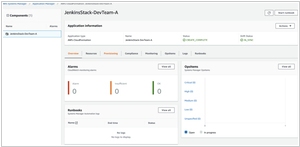AWS CloudFormation vs AWS OpsWorks
July 30, 2023 | Author: Michael Stromann
See also:
Top 10 Cloud Management platforms
Top 10 Cloud Management platforms
AWS CloudFormation and AWS OpsWorks are both powerful services offered by Amazon Web Services (AWS) to facilitate the management and deployment of resources and applications in the cloud. However, they serve distinct purposes and have key differences in their approaches.
AWS CloudFormation is a service that allows users to define and provision infrastructure as code. It enables the automatic provisioning and updating of AWS resources using JSON or YAML templates, which describe the desired configuration. CloudFormation handles resource dependencies, ordering, and rollback in case of failures. It is an excellent choice for managing complex and multi-tiered infrastructure setups, as it supports a wide range of AWS resources and services. CloudFormation provides a high level of control and visibility into the resources being provisioned, making it suitable for more advanced users or those who need precise control over their infrastructure.
On the other hand, AWS OpsWorks is a configuration management service that focuses on automating application deployment, scaling, and lifecycle management. It utilizes Chef or Puppet, popular configuration management tools, to define the software packages, libraries, and configuration settings required for an application. OpsWorks provides a layered architecture for organizing applications, making it easier to manage different components separately. It is particularly well-suited for managing application stacks and simplifying the deployment of applications with built-in lifecycle events. OpsWorks is often favored by developers and application administrators who want a more streamlined approach to deploying and managing applications without worrying about the underlying infrastructure.
See also: Top 10 Cloud Management platforms
AWS CloudFormation is a service that allows users to define and provision infrastructure as code. It enables the automatic provisioning and updating of AWS resources using JSON or YAML templates, which describe the desired configuration. CloudFormation handles resource dependencies, ordering, and rollback in case of failures. It is an excellent choice for managing complex and multi-tiered infrastructure setups, as it supports a wide range of AWS resources and services. CloudFormation provides a high level of control and visibility into the resources being provisioned, making it suitable for more advanced users or those who need precise control over their infrastructure.
On the other hand, AWS OpsWorks is a configuration management service that focuses on automating application deployment, scaling, and lifecycle management. It utilizes Chef or Puppet, popular configuration management tools, to define the software packages, libraries, and configuration settings required for an application. OpsWorks provides a layered architecture for organizing applications, making it easier to manage different components separately. It is particularly well-suited for managing application stacks and simplifying the deployment of applications with built-in lifecycle events. OpsWorks is often favored by developers and application administrators who want a more streamlined approach to deploying and managing applications without worrying about the underlying infrastructure.
See also: Top 10 Cloud Management platforms





